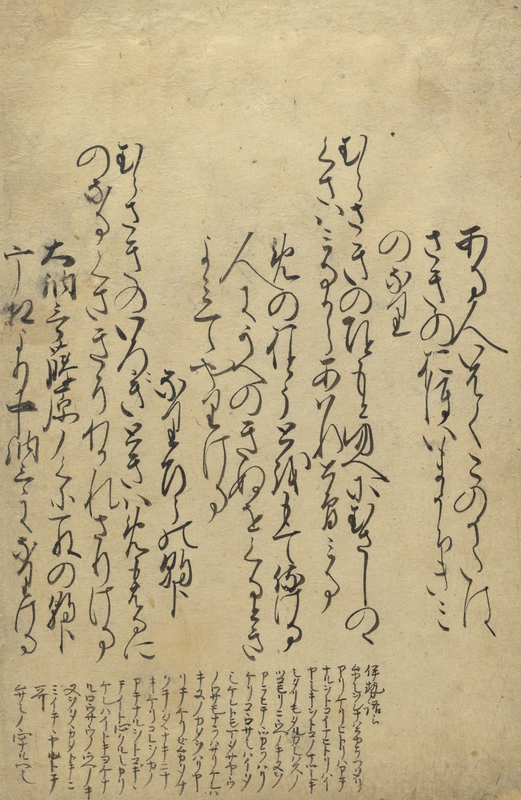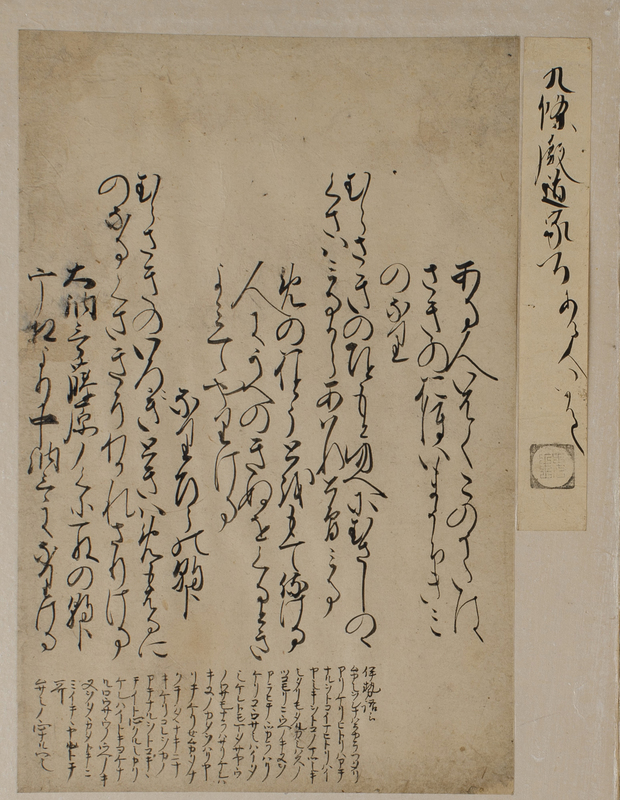029 Poems from Kokin wakashū (Collection of Poems Ancient and Modern); opening verse of the first poem on the fragment, murasaki no (むらさきの)
Item
Title
029 Poems from Kokin wakashū (Collection of Poems Ancient and Modern); opening verse of the first poem on the fragment, murasaki no (むらさきの)
Calligrapher
Attributed to Kujō Michi'ie (1193-1252)
Culture
Japanese
Style/period
Kamakura (1192–1333)
Date
13th century
Material
Calligraphy fragment; ink on paper
Measurements
21.9 x 14.4 cm
Identifier
Z42_4j3_015a_029
Item Locator
Z42.4 J3
Transcription
ある人いはくこのうたは/さきのおほいまうちきみ/のなり/
むらさきのひともとゆへにむさしのゝ/くさはみなからあはれとそみる/
めのおとうとをもて侍ける/人にうへのきぬをくるとき/よみてやりける/
なりひらの朝臣/
むらさきのいろこきときはめもはるに/のなるくさきそわかれさりける/
大納言藤原のくにつねの朝臣/宰相より中納言になりける
欄外下部、勘物:
伊勢語云/
ムカシヲンナハラカラフタリ/アリケリヒトリハアテ/ナルヲトコイマヒトリハイ/ヤシキヲトコノマツシキ/シタリモタルカシハスノ/ツコモリニウヘノキヌヲ/アラヒテヽツカラハリ/ケリコヽロサシハイタ/シケレトモマタサヤウ/ノワサモナラハサリケレハ/キヌノカタヲハリヤ/リテケリセムカタナ/クテタヽナキニナ/キケリコレヲカノ/アテナルヲトコキヽ/テイト心クルシカリ/ケレハイトキヨケナ/ルロウサウノウヘノキ/ヌヲタヽカタトキニ/ミイテヽヤルトテ/哥/ムサシノヽ心ナルヘシ
むらさきのひともとゆへにむさしのゝ/くさはみなからあはれとそみる/
めのおとうとをもて侍ける/人にうへのきぬをくるとき/よみてやりける/
なりひらの朝臣/
むらさきのいろこきときはめもはるに/のなるくさきそわかれさりける/
大納言藤原のくにつねの朝臣/宰相より中納言になりける
欄外下部、勘物:
伊勢語云/
ムカシヲンナハラカラフタリ/アリケリヒトリハアテ/ナルヲトコイマヒトリハイ/ヤシキヲトコノマツシキ/シタリモタルカシハスノ/ツコモリニウヘノキヌヲ/アラヒテヽツカラハリ/ケリコヽロサシハイタ/シケレトモマタサヤウ/ノワサモナラハサリケレハ/キヌノカタヲハリヤ/リテケリセムカタナ/クテタヽナキニナ/キケリコレヲカノ/アテナルヲトコキヽ/テイト心クルシカリ/ケレハイトキヨケナ/ルロウサウノウヘノキ/ヌヲタヽカタトキニ/ミイテヽヤルトテ/哥/ムサシノヽ心ナルヘシ
Transliteration
KKS XVII: 867 aru hito iwaku kono uta wa saki no ōi mōchi gimi no nari
murasaki no / hitomoto yue ni / musashino no / kusa ha mi nagara / aware to zo miru
me no otōto wo mote haberikeru hito ni ue no kinu okuru toki yomite yarikeru
narihira no ason
KKS XVII: 868 murasaki no / iro koki toki wa / me mo haru ni / no naru kusaki zo / wakare zari keru
dainagon fujiwara no kunitsune no asomi saishō yori chūnagon ni narikeru
KKS XVII: 869
isego iu
Ise Monogatari 41
mukashi onna harakara futari ari keri hitori wa atenaru otoko ima hitori wa iyashiki otoko no mazushiki shitari motaru ga shiwasu no tsugomori ni ue no kinu wo araite tezukara hari keri kokorozashi wa itashi keredomo mata sayō no waza mo narawazari kereba kinu no kata wo hari yarite keri semu kata nakute tada naki ni naki keri kore wo ka no atenaru otoko kikite ito kokoro gurushikari kereba ito kiyoke naru rōsō no ue no kinu wo tatakata toki ni mi idete yaru tote
uta
musashino no kokoro naru beshi
murasaki no / hitomoto yue ni / musashino no / kusa ha mi nagara / aware to zo miru
me no otōto wo mote haberikeru hito ni ue no kinu okuru toki yomite yarikeru
narihira no ason
KKS XVII: 868 murasaki no / iro koki toki wa / me mo haru ni / no naru kusaki zo / wakare zari keru
dainagon fujiwara no kunitsune no asomi saishō yori chūnagon ni narikeru
KKS XVII: 869
isego iu
Ise Monogatari 41
mukashi onna harakara futari ari keri hitori wa atenaru otoko ima hitori wa iyashiki otoko no mazushiki shitari motaru ga shiwasu no tsugomori ni ue no kinu wo araite tezukara hari keri kokorozashi wa itashi keredomo mata sayō no waza mo narawazari kereba kinu no kata wo hari yarite keri semu kata nakute tada naki ni naki keri kore wo ka no atenaru otoko kikite ito kokoro gurushikari kereba ito kiyoke naru rōsō no ue no kinu wo tatakata toki ni mi idete yaru tote
uta
musashino no kokoro naru beshi
Translation
Some say this poem is by the Former Regent and Chancellor
KKS XVII: 867 a single stalk of / royal purple upon the / Moor of Musashi / makes me love all the other / wild grasses all the more
KKS XVII: 868 Sent with a formal cloak to the husband of his wife’s younger sister -[Ariwara no ] Narihira. when the color of / royal purple is deepest / it casts its glow as / far as I can see over / all the plants in the meadows
KKS XVII: 869 Composed and sent with a gift of undyed figured silk to be used for a formal robe when Major Counsellor Fujiwara no Kunitsune was promoted from Consultant to Middle Counsellor. [ah my lord do you / think me as colorless as / this cloth even though / I have imbued it with the / love that long has dyed my heart] (Rodd 2017, pp. 298-299)
KKS XVII: 867 Because of this one / precious murasaki plant, / I feel affection / for all the grasses and shrubs / growing on the Musashi plain. -Anonymous
KKS XVII: 868 Composed to accompany a cloak sent as a gift to the husband of his wife's younger sister. When deep color stains / the murasaki's purple roots, / we cannot but prize / each grass and shrub on the plain / stretching into the distance. -Narihira no Ason KKS XVII 869: Composed to accompany some undyed damask for a cloak, sent as a gift to Fujiwara Kunitsune when Kunitsune was promoted from Constultant to Middle Counselor. [Though you may think it / lacking in both taste and hue, / it is in truth dyed / with the fathomless color of long-standing affection.] (McCullough 1985, p. 190)
an Ise story retold:
Ise Monogatari 41: Purple Bonds
Long ago, there were two sisters. One married an impoverished man of inferior rank and the other a sophisticated man of high rank. On New Year’s Eve, the wife of the low-ranking one washed her husband’s formal wear. Then, she stretched the fabric by herself. She put her whole heart into it, but as she was unaccustomed to menial work, she ended up tearing a shoulder of the robe. There was nothing that she could do to remedy the matter, so she wept inconsolably. Her higher-ranking brother-in-law found her plight deeply affecting. Taking out a fine green robe of his own, he presented it to her with a poem: [Our bond is as deep / as the purple roots of spring. / and, to me, you and your sister / are inseparable / as budding grasses on the plain.] This poem was surely based on the ‘Plain of Musashi’ poem. (MacMillan 2016, pp. 186-187).
Ise Monogatari 41
Once there were two sisters, one married to an impoverished man of inferior rank and the other to a man of consequence. Toward the end of the Twelfth Month in a certain year, the wife of the low-ranking man washed his formal cloak and personally stretched it out to dry. She was very careful, but being unaccustomed to such menial labor she stretched the material too far and split the shoulder. There was nothing to be done; she could only sit and weep. When the man of high rank heard about it, he found her plight most affecting. He got hold of a handsome blue coak and sent it to her with this poem: When the murasaki’s hue / Is strong and deep, / One can distinguish / No other plant / On the vast plain. No doubt he was thinking of the poem about Musashi Plain. (McCullough 1968, pp. 98-99)
KKS XVII: 867 a single stalk of / royal purple upon the / Moor of Musashi / makes me love all the other / wild grasses all the more
KKS XVII: 868 Sent with a formal cloak to the husband of his wife’s younger sister -[Ariwara no ] Narihira. when the color of / royal purple is deepest / it casts its glow as / far as I can see over / all the plants in the meadows
KKS XVII: 869 Composed and sent with a gift of undyed figured silk to be used for a formal robe when Major Counsellor Fujiwara no Kunitsune was promoted from Consultant to Middle Counsellor. [ah my lord do you / think me as colorless as / this cloth even though / I have imbued it with the / love that long has dyed my heart] (Rodd 2017, pp. 298-299)
KKS XVII: 867 Because of this one / precious murasaki plant, / I feel affection / for all the grasses and shrubs / growing on the Musashi plain. -Anonymous
KKS XVII: 868 Composed to accompany a cloak sent as a gift to the husband of his wife's younger sister. When deep color stains / the murasaki's purple roots, / we cannot but prize / each grass and shrub on the plain / stretching into the distance. -Narihira no Ason KKS XVII 869: Composed to accompany some undyed damask for a cloak, sent as a gift to Fujiwara Kunitsune when Kunitsune was promoted from Constultant to Middle Counselor. [Though you may think it / lacking in both taste and hue, / it is in truth dyed / with the fathomless color of long-standing affection.] (McCullough 1985, p. 190)
an Ise story retold:
Ise Monogatari 41: Purple Bonds
Long ago, there were two sisters. One married an impoverished man of inferior rank and the other a sophisticated man of high rank. On New Year’s Eve, the wife of the low-ranking one washed her husband’s formal wear. Then, she stretched the fabric by herself. She put her whole heart into it, but as she was unaccustomed to menial work, she ended up tearing a shoulder of the robe. There was nothing that she could do to remedy the matter, so she wept inconsolably. Her higher-ranking brother-in-law found her plight deeply affecting. Taking out a fine green robe of his own, he presented it to her with a poem: [Our bond is as deep / as the purple roots of spring. / and, to me, you and your sister / are inseparable / as budding grasses on the plain.] This poem was surely based on the ‘Plain of Musashi’ poem. (MacMillan 2016, pp. 186-187).
Ise Monogatari 41
Once there were two sisters, one married to an impoverished man of inferior rank and the other to a man of consequence. Toward the end of the Twelfth Month in a certain year, the wife of the low-ranking man washed his formal cloak and personally stretched it out to dry. She was very careful, but being unaccustomed to such menial labor she stretched the material too far and split the shoulder. There was nothing to be done; she could only sit and weep. When the man of high rank heard about it, he found her plight most affecting. He got hold of a handsome blue coak and sent it to her with this poem: When the murasaki’s hue / Is strong and deep, / One can distinguish / No other plant / On the vast plain. No doubt he was thinking of the poem about Musashi Plain. (McCullough 1968, pp. 98-99)
Description
Information on kiwame fuda (Identification/Authentication slip): 九條殿道家公 ある人いはく
(極印)印文不読
(筆跡)朝倉茂入(初代)に近いか?
(極印)印文不読
(筆跡)朝倉茂入(初代)に近いか?
Attributed to Kujō-dono Michiie-kō; Authentication Seal: [unidentified]; Authenticator: Asakura Monyū I (?)
Upper Phrase (kami no ku) Height: 11.2 cm
Source
〈第一巻 1〉古今和歌集(伊達家旧蔵本)コキンワカシュウ古今和歌集巻第十七雑歌上ある人のいはく、この歌はさきのおほいまうち君のなり867紫のひともとゆゑにむさしのの草はみながらあはれとぞ見るめのおとうとをもて侍りける人にうへのきぬをおくるとてよみてやりけるなりひらの朝臣868紫の色こき時はめもはるに野なる草木ぞわかれざりける大納言ふぢはらのくにつねの朝臣の宰相より中納言になりける時、そめぬうへのきぬあやをおくるとてよめる近院右のおほいまうちぎみ869色なしと人や見るらむ昔よりふかき心にそめてしものを
Gertrude Bass Warner Memorial Library
Spatial Coverage
Japan
Language
Japanese
Repository
University of Oregon. Libraries. Special Collections & University Archives
Institution
University of Oregon
Type
Image
Format
image/jpeg
Rights
No Copyright - United States
Rights Holder
University of Oregon. Libraries. Special Collections & University Archives

